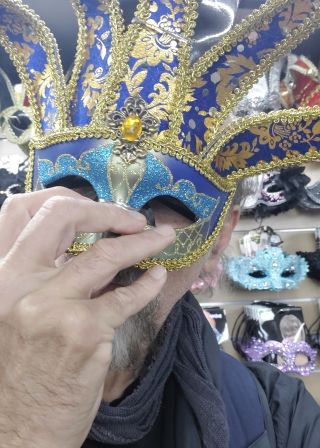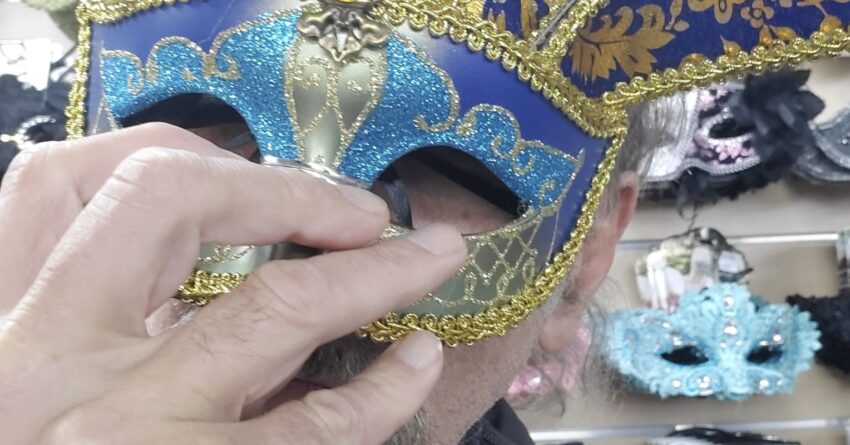
Source: Fumiste Studios, used with permission
This is the first of two posts on imposter syndrome and writers.
Last week, I attended a fundraising gala for a venerable American institution in Paris. To attend cost thousands of euros; I was invited only because the friend of an old friend dropped out, and I was offered a comp ticket. I was and am wholeheartedly supportive of this institution, which promotes books by writers like myself, but standing in my black jeans, frayed jacket, and light wallet in a Louis XV palace on Place de la Concorde, on the fringes of a wealthy, self-confident, Armani-wearing crowd, listening to a speech by an internationally famous, best-selling New York Times columnist—I felt like a failure, someone who didn’t measure up in terms of talent or abilities. Furthermore, I felt I was a fraud, a spy, like the one person who had not joined alien society at the end of Invasion of the Body Snatchers. Donald Sutherland was about to call me out with an unearthly shriek.
I felt like an imposter.
I am familiar with imposter syndrome. As a middle-middle-class, half-French, half-American person, raised in the U.S., France, and to a lesser extent Austria, educated in the French educational system and then in the British, I spent my early years desperately trying to pretend I fully belonged to one place, culture, and language the way “normal” people did—knowing all the while this wasn’t true. Being an inveterate slacker, a poor student in a Napoleonic system with its emphasis on rote work, grades, and exams, I had beaten into me a lack of faith in my own intelligence and abilities, which persisted even after I had earned higher degrees from prestigious universities and published multiple novels and non-fiction books that earned praise, awards, and even (occasionally) rave reviews.
“People Will Discover the Truth”
Thus, when I first heard of imposter syndrome—also known as “fraud syndrome”—it rang a bell so loud my mental ears were deafened. Here’s the Psychology Today thumbnail description of the syndrome: “People who struggle with imposter syndrome believe that they are undeserving of their achievements and the high esteem in which they are, in fact, generally held. They feel that they aren’t as competent or intelligent as others might think—and that soon enough, people will discover the truth about them.”
The National Institutes of Health weigh in: “Individuals [with imposter syndrome] cannot internalize their success and subsequently experience pervasive feelings of self-doubt, anxiety, depression, and/or apprehension of being exposed as a fraud in their work, despite verifiable and objective evidence of their successfulness.”
Dubious nouns like “successfulness” notwithstanding, the literature that exists on “imposter” or “fraud” syndrome is extensive and cohesive. It acknowledges that, while not a medically approved psychosis, the syndrome is real and can be harmful; that it particularly affects people in academic and health-care fields; and that women and minorities are disproportionately and predictably subject to its downstream effects of depression, stress, anxiety, and burnout.
But I’m not here to go over the literature. What interests me is the extent to which writers in general, and fiction writers in particular, might fold comfortably into a target audience for the syndrome, a subject which has not been written about much—except, of course, by writers. Try Googling “imposter syndrome for writers” and you will spend hours going through articles and posts, usually signed by writers, with titles such as “Am I Boring? And Other Questions Imposter Syndrome Asks an Established Author” (Writer’s Digest), “How women who want to be writers overcome challenges like imposter syndrome” (Australian Broadcasting Corporation), and “You are not a fraud: How to overcome Imposter Syndrome” (Writer Unboxed). Many hundreds more of such posts exist online.
“Am I Good Enough?”
Here is one factor that makes writers particularly vulnerable to the syndrome: Just like fine-artists, writers must confront the personal issue of “being good enough” in a trade where (unlike, say, in thoracic surgery) few objective standards of quality or competence exist—a trade in which one’s worth tends to be fixed by editors struggling to reproduce the latest self-help bestseller, by reviewers subject to market trends and personal prejudice, and by a reading public whose spare time is increasingly soaked up by Instagram reels. In such a profession the percentage of writers who are published, let alone achieve substantial acclaim, is microscopic, and those of us whose books didn’t even get shortlisted for the Cheatgrass County Poetry Association’s “Nice Try” award, let alone for a Pulitzer, are always going to wonder whether it wasn’t our fundamental lack of talent and originality that lay at the heart of our failure.
“The subjectivity of the work we do as writers is major impostor syndrome fuel,” according to Sarah Archer, writing in the Phoenix Screenwriters Association newsletter. “There’s no such thing as a true, indisputable standard of merit for any creative work. What’s ‘good’ to one person—funny, touching, smart, relatable, thrilling, beautiful—may fall entirely flat to [sic] another.”
Moreover, in a culture that chains self-worth to financial success, in a profession where the vast majority of us cannot make a good living, it seems inevitable that most writers are going to question their abilities and consider themselves a fraud when judged by the world at large. Sarah Archer again: “Even professional writers do many, many hours of work for free. If your time isn’t ‘worth’ anything to anyone else, in a clear, measurable way, it’s easy to question whether your work is worth anything at all. How can you assign value to your own writing?”
Imposter Syndrome Essential Reads
Next post: How their observer status, and their need to fully inhabit characters, help drive imposter syndrome in writers: and why that’s maybe not a bad thing
